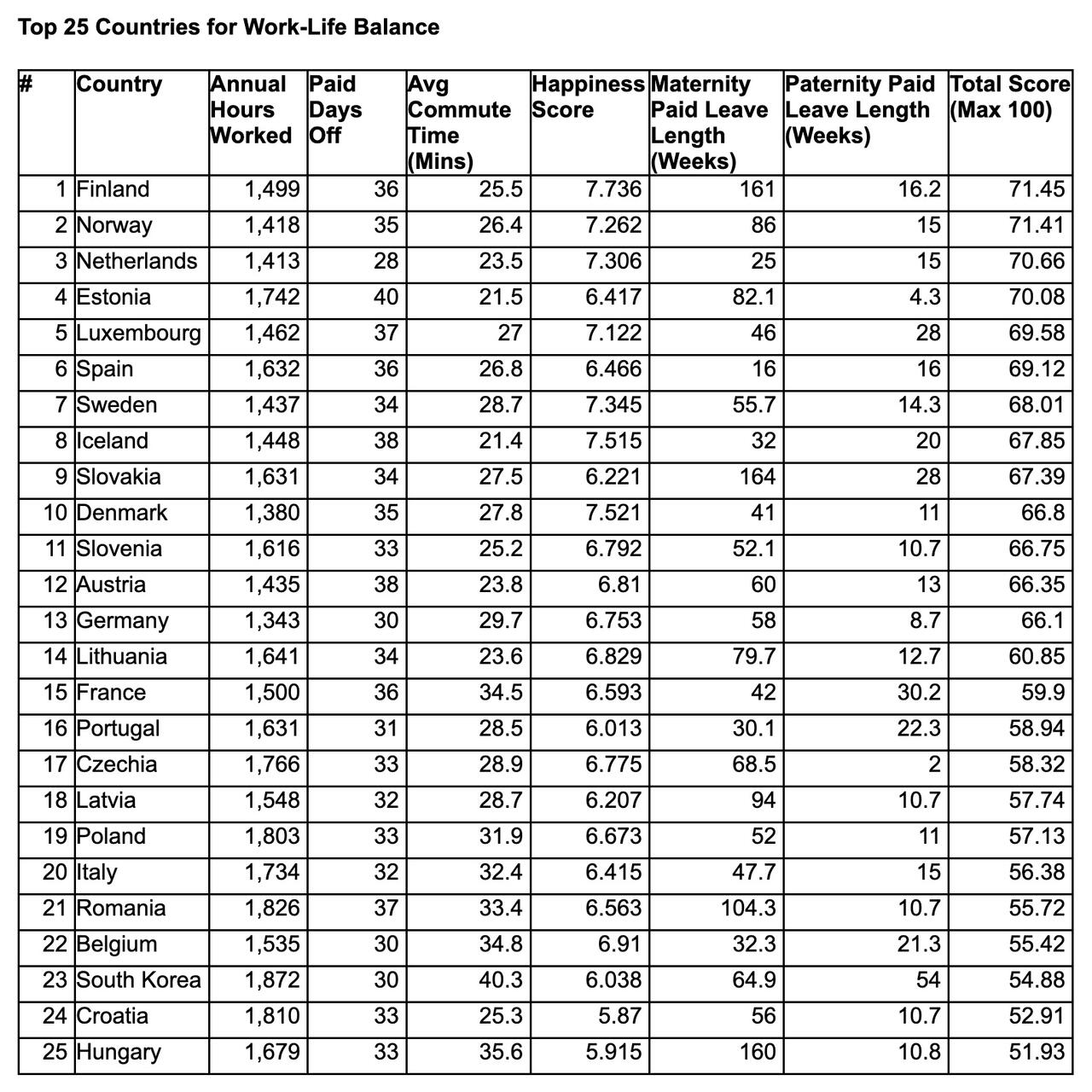See other World News Articles
Title: These Are The Best And Worst Countries For Work (US Last Place)-Life Balance
Source:
[None]
URL Source: https://www.zerohedge.com/markets/t ... st-countries-work-life-balance
Published: Aug 25, 2025
Author: Tyler Durden
Post Date: 2025-08-25 08:25:30 by Horse
Keywords: None
Views: 47
Comments: 2
When it comes to work-life balance, some countries are setting global standards while others lag far behind. A new analysis of 39 nations by CompareTheMarket reveals where employees enjoy the healthiest mix of work and personal life — and where long hours, limited leave, and lack of support take the greatest toll. The study assessed 10 factors including working hours, paid leave, commute length, parental support, remote work availability, and happiness scores. The results show striking differences between the top and bottom performers, underlining how policy, culture, and workplace expectations shape daily life. At the top of the ranking is Finland, with a total score of 71.45 out of 100. Finnish employees work an average of 1,499 hours per year, significantly less than countries such as Australia or the US, and are entitled to 36 days of paid leave. Family policies are especially generous: mothers can take up to 161 weeks of paid maternity leave while fathers are granted more than 16 weeks. People in Finland also spend about 15.2 hours each day on personal care and leisure, face an average commute of just over 25 minutes, and report a happiness score of 7.7 out of 10. Remote work opportunities are also strong, making Finland the clear leader. Close behind is Norway with a score of 71.41. Norwegians work even fewer hours, averaging 1,418 per year, and receive 35 days of paid leave. The country also offers extensive support for parents and continues to prioritize personal well-being alongside professional life. At the opposite end of the scale is the United States, ranked 39th out of 39 with a total score of just 28.01. Despite being known for innovation, the US suffers from some of the longest working hours in the study, averaging 1,799 annually. It is the only country in the ranking without federally mandated paid annual leave or paid parental leave. Americans devote only 14.6 hours per day to personal care and leisure, and while remote work is accessible and the national happiness score sits mid-range, these positives are overshadowed by limited structural support. For many Americans, “balancing work and life is largely an individual effort,” and the data confirms how challenging that can be. The rest of the top 10 is dominated by Nordic and nearby European countries. Sweden (68.01), Iceland (67.85), and Denmark (66.8) join Finland and Norway, while the Netherlands (70.66), Luxembourg (69.58), Spain (69.12), and Estonia (70.08) also score highly. Estonia stands out in particular for offering 40 paid days off, the most in the index, alongside strong digital infrastructure and growing flexibility in work arrangements. What unites these nations is a shared culture where long hours are not seen as a badge of honour, paid leave is generous, and both mothers and fathers receive parental support. As the findings suggest, when shorter work weeks, higher happiness scores, and supportive policies align, people thrive. Australia finds itself near the bottom, ranking 31st with a score of 45.9. Australians average 1,651 hours of work each year and receive 30 paid days off, which is lower than in many top-ranked countries. On a daily basis, people spend 14.4 hours on personal care and leisure, less than their Nordic counterparts. Parental leave is a weak spot: mothers get 18 weeks at 46.1% pay, while fathers are offered only two weeks. Commutes are long as well, averaging 37.4 minutes each way. On the brighter side, remote work is widely available, and the country’s happiness rating is 6.9 out of 10, showing that many Australians still manage to find balance despite the obstacles. With stronger leave entitlements, greater flexibility, and more support for families, Australia could improve its standing significantly. The overall lesson from the data is clear. The countries at the top have built systems that encourage people to rest, spend time with family, and enjoy life outside of work. Meanwhile, those at the bottom place the burden on individuals to carve out their own balance, often with little institutional help. As the report puts it, work-life balance “is not just a luxury, it is essential for individuals, families, workplaces, and communities alike.” The evidence also shows that when “work complements life, rather than competing with it, everyone wins.” The full study can be viewed here. Poster Comment: German Economy Shows No Signs Of Emerging From Recession The monthly Mittelstand index, compiled by the consulting firm DATEV, confirms that the downturn continues unabated. The crisis has spread across virtually all sectors of the economy. https://www.zerohedge.com/markets/german-economy-shows-no-signs-emerging-recession 
Post Comment Private Reply Ignore Thread
Top • Page Up • Full Thread • Page Down • Bottom/Latest
Begin Trace Mode for Comment # 1.
#1. To: All (#0)
Crime Plunges In Washington DC After Trump Launches Historic Crackdown Residents have taken to social media to praise the sudden drop in muggings, car jackings and murders.. https://www.zerohedge.com/political/crime-plunges-washington-dc-after- trump-launches-historic-crackdown
#2. To: All (#1)
It's Now Twice As Expensive To Buy An Entry-Level Home Than Rent Thinking of buying a starter home? Be careful!
Top • Page Up • Full Thread • Page Down • Bottom/Latest
Replies to Comment # 1. https://www.zerohedge.com/personal-finance/its-now-twice-expensive-buy-entry-level-home-rent
End Trace Mode for Comment # 1.